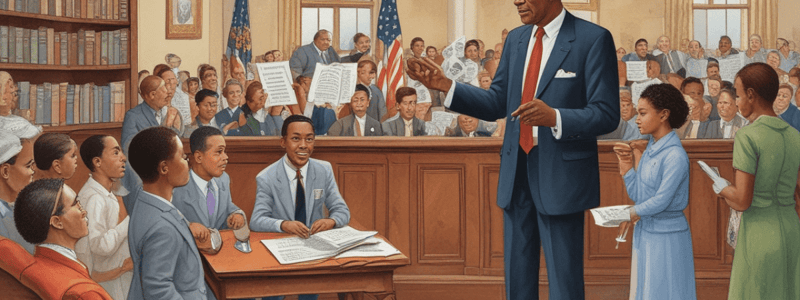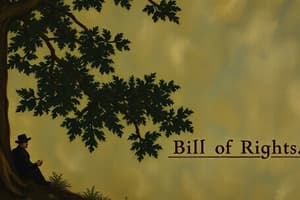Podcast
Questions and Answers
What is the difference between civil liberties and civil rights?
What is the difference between civil liberties and civil rights?
- Civil liberties and civil rights are the same thing.
- Civil rights are basic freedoms, while civil liberties are equal rights and treatment under the law.
- Civil liberties are basic freedoms protected from government abuse, while civil rights are equal rights and treatment under the law provided by the government. (correct)
- Civil liberties are guaranteed by the Constitution, while civil rights are not.
How has the Supreme Court incorporated the Bill of Rights to apply to the states?
How has the Supreme Court incorporated the Bill of Rights to apply to the states?
- Through the Equal Protection Clause and Due Process Clause of the 14th Amendment. (correct)
- Through the Privileges and Immunities Clause of the 14th Amendment.
- Through the Establishment Clause of the First Amendment.
- Through the Free Exercise Clause of the First Amendment.
Which of the following amendments has the Supreme Court not incorporated to apply to the states?
Which of the following amendments has the Supreme Court not incorporated to apply to the states?
- The Fourth Amendment
- The Second Amendment (correct)
- The Fifth Amendment
- The First Amendment
Which Supreme Court case allowed cities to regulate peaceful assembly in public places by setting rules for protests that apply equally to all?
Which Supreme Court case allowed cities to regulate peaceful assembly in public places by setting rules for protests that apply equally to all?
Which of the following is an example of symbolic speech protected by the First Amendment?
Which of the following is an example of symbolic speech protected by the First Amendment?
Which of the following amendments has the Supreme Court not incorporated to apply to the states?
Which of the following amendments has the Supreme Court not incorporated to apply to the states?
Which of the following is NOT a key difference between civil liberties and civil rights?
Which of the following is NOT a key difference between civil liberties and civil rights?
Which of the following is a key principle of the Supreme Court's interpretation of the First Amendment's protection of free speech?
Which of the following is a key principle of the Supreme Court's interpretation of the First Amendment's protection of free speech?
Which of the following constitutional protections has the Supreme Court not incorporated to apply to the states?
Which of the following constitutional protections has the Supreme Court not incorporated to apply to the states?
Which of the following best describes the concept of $\text{symbolic speech}$ under the First Amendment?
Which of the following best describes the concept of $\text{symbolic speech}$ under the First Amendment?
Which of the following best describes the Supreme Court's approach to incorporating the Bill of Rights to apply to the states?
Which of the following best describes the Supreme Court's approach to incorporating the Bill of Rights to apply to the states?
Which of the following best describes the concept of $\text{prior restraint}$ in relation to the First Amendment?
Which of the following best describes the concept of $\text{prior restraint}$ in relation to the First Amendment?
Study Notes
Civil Liberties and Civil Rights
- Basic freedoms guaranteed by the Constitution, protected from government abuse
- Examples include religious freedom
Equality Under the Law
- Civil rights ensure equal rights and treatment under the law for all citizens
- Government is responsible for providing these rights
Supreme Court and the Bill of Rights
- Most Supreme Court decisions applying the Bill of Rights to states use the Equal Protection Clause and Due Process Clause of the 14th Amendment (Incorporation)
- The Supreme Court has not incorporated the 2nd Amendment right to bear arms, resulting in different gun laws in different states
Freedom of Assembly and Speech
- The Supreme Court case Hague v. CIO allows cities to regulate peaceful assembly in public places by setting rules for protests that apply equally to all
- The 1st Amendment protects freedom of speech, including symbolic speech (e.g., burning flags in protest)
Protection from Government Overreach
- Prior restraint occurs when the government tries to prevent the press from publishing certain material
- The 5th, 6th, 7th, and 8th Amendments provide additional protections, including the right to remain silent (no self-incrimination) and a fair and speedy trial by jury
National, State, and Local Powers
- National government has expressed powers, concurrent powers shared with states, and reserved powers that belong to states
- The national government must guarantee each state has a republican structure
- Presidents Nixon and Reagan believed in devolution, giving power back to states, while President Johnson supported regulated federalism, where state and local government carry out national agendas
Establishing Local Government
- Local governments are established to carry out national agendas
Studying That Suits You
Use AI to generate personalized quizzes and flashcards to suit your learning preferences.
Description
Test your knowledge on the differences between civil liberties and civil rights, as well as their implications on government actions and citizen protections. Explore the concepts of equal treatment under the law, Bill of Rights interpretation, and the incorporation of rights through Supreme Court decisions.




